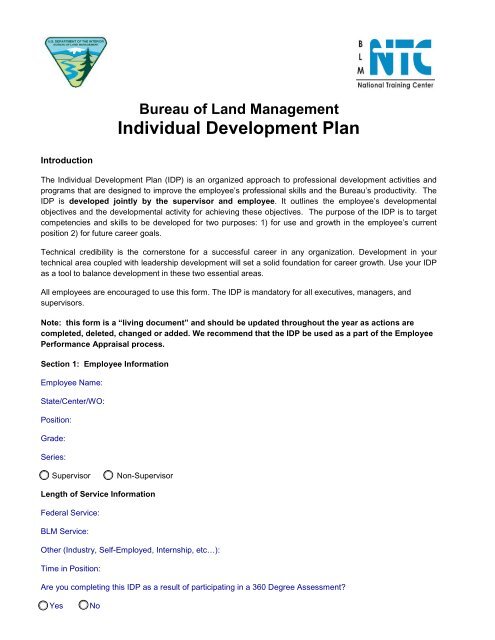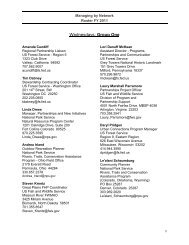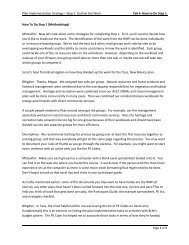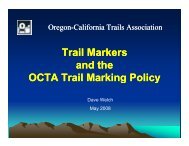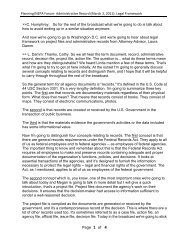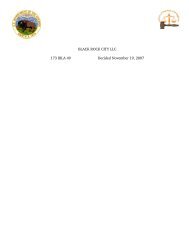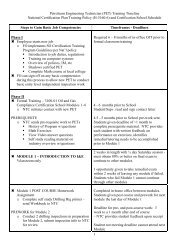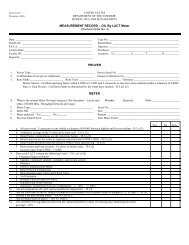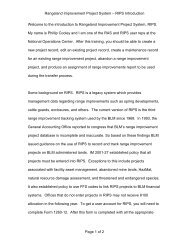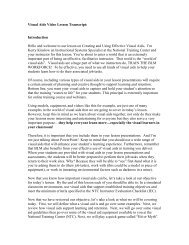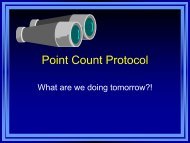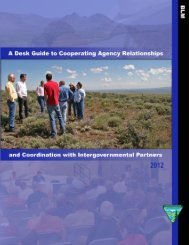Bureau of Land Management Individual Development Plan
Bureau of Land Management Individual Development Plan
Bureau of Land Management Individual Development Plan
You also want an ePaper? Increase the reach of your titles
YUMPU automatically turns print PDFs into web optimized ePapers that Google loves.
<strong>Bureau</strong> <strong>of</strong> <strong>Land</strong> <strong>Management</strong><br />
<strong>Individual</strong> <strong>Development</strong> <strong>Plan</strong><br />
Introduction<br />
The <strong>Individual</strong> <strong>Development</strong> <strong>Plan</strong> (IDP) is an organized approach to pr<strong>of</strong>essional development activities and<br />
programs that are designed to improve the employee’s pr<strong>of</strong>essional skills and the <strong>Bureau</strong>’s productivity. The<br />
IDP is developed jointly by the supervisor and employee. It outlines the employee’s developmental<br />
objectives and the developmental activity for achieving these objectives. The purpose <strong>of</strong> the IDP is to target<br />
competencies and skills to be developed for two purposes: 1) for use and growth in the employee’s current<br />
position 2) for future career goals.<br />
Technical credibility is the cornerstone for a successful career in any organization. <strong>Development</strong> in your<br />
technical area coupled with leadership development will set a solid foundation for career growth. Use your IDP<br />
as a tool to balance development in these two essential areas.<br />
All employees are encouraged to use this form. The IDP is mandatory for all executives, managers, and<br />
supervisors.<br />
Note: this form is a “living document” and should be updated throughout the year as actions are<br />
completed, deleted, changed or added. We recommend that the IDP be used as a part <strong>of</strong> the Employee<br />
Performance Appraisal process.<br />
Section 1: Employee Information<br />
Employee Name:<br />
State/Center/WO:<br />
Position:<br />
Grade:<br />
Series:<br />
Supervisor<br />
Non-Supervisor<br />
Length <strong>of</strong> Service Information<br />
Federal Service:<br />
BLM Service:<br />
Other (Industry, Self-Employed, Internship, etc…):<br />
Time in Position:<br />
Are you completing this IDP as a result <strong>of</strong> participating in a 360 Degree Assessment<br />
O Yes<br />
O No
Section 2: Your Career Goals and <strong>Development</strong>al Objectives<br />
You and your supervisor should work together to complete the goals for successful performance in your<br />
current position and your short- and long-term career goals. Your career goals may focus on developing your<br />
technical credibility for your current position or helping you bridge into another position. The more specific you<br />
can be with defining your goals, the easier it will be to identify actions that will help you achieve them.<br />
Short Term Career Goals (up to 1 year)<br />
(Example: Improve skills to qualify for a Senior<br />
Recreation <strong>Plan</strong>ner position)<br />
<strong>Development</strong>al Objectives<br />
Objectives describe what you need to learn or achieve<br />
in order to reach your short term goals. <strong>Development</strong>al<br />
objectives should be as specific as possible Examples:<br />
write NEPA documents, develop leadership skills,<br />
improve presentation skill, improve technical<br />
presentation skills, help in developing an RMP and<br />
partnerships, etc…<br />
Long Term Career Goals (2-5 years)<br />
(Example Become a Field Manager)<br />
<strong>Development</strong>al Objectives<br />
In this section describe what you need to learn or<br />
achieve in order to reach your long term goal<br />
Examples: learn how to facilitate a public meeting,<br />
learn how to supervise supervisors develop others,<br />
improve facilitation skills, understand the budget<br />
process, work on RMP, etc.
Section 3: Competency Review<br />
A solid organization is built on the premise that anyone can be a leader. Leadership should permeate through<br />
all levels. The framework below reflects leadership competencies targeted for various levels <strong>of</strong> employee<br />
development. The listed competencies are not meant to replace or eliminate science or the technical<br />
competencies. They are listed as a supplement to building on your technical credibility. Review this framework<br />
with your supervisor along with the itemized list <strong>of</strong> each <strong>of</strong> these competencies in the Leadership Competency<br />
Check List on the next page. Check those competencies you need to improve to support your short term<br />
career goals and those you will need to develop which support your long term goals. After completing this<br />
process for all 28 competencies, select the top 2-3 competencies to target for your personal development this<br />
year. Definitions <strong>of</strong> each competency are found in the appendix to this document.<br />
*Executive (Leading and<br />
Managing Organizations)<br />
BLM Leadership <strong>Development</strong> Competency Framework<br />
Employee Level Competencies Emphasized Examples <strong>of</strong> Courses<br />
Entrepreneurship<br />
SES Candidate <strong>Development</strong><br />
External Awareness<br />
Program<br />
Vision<br />
Manager (Leading and<br />
Managing Programs)<br />
Supervisory (Leading and<br />
Managing People)<br />
Project Manager and Team<br />
Leader (Managing Projects)<br />
All Employees (Managing<br />
Yourself)<br />
Creativity and Innovation<br />
Financial <strong>Management</strong><br />
Partnering<br />
Political Savvy<br />
Strategic Thinking<br />
Technology <strong>Management</strong><br />
Accountability<br />
Conflict <strong>Management</strong><br />
Developing Others<br />
Human Capital <strong>Management</strong><br />
Leveraging Diversity<br />
Decisiveness<br />
Influencing Negotiating<br />
Team Building<br />
Technical Credibility<br />
Continual Learning<br />
Customer Service<br />
Flexibility<br />
Integrity/Honesty<br />
Interpersonal Skills<br />
Oral Communications<br />
Problem Solving<br />
Public Service Motivation<br />
Resilience<br />
Written Communication<br />
Leadership Academy<br />
Supervisory Training<br />
Leadership Academy<br />
Emerging Leaders<br />
Transitioning to a Supervisory<br />
Role<br />
Team Training<br />
New Employee Orientation<br />
Local Perspectives<br />
SCEP<br />
Pathways<br />
*Leadership <strong>Development</strong> at the Executive Level is managed by the Office <strong>of</strong> Personnel <strong>Management</strong>.
Leadership Competency Check List<br />
Competency<br />
Need to Improve in<br />
my current job<br />
Needed for career<br />
advancement<br />
Selected to Develop<br />
Creativity and Innovation<br />
External Awareness<br />
Resilience<br />
Flexibility<br />
Strategic Thinking<br />
Vision<br />
Conflict <strong>Management</strong><br />
Leveraging Diversity<br />
Developing Others<br />
Team Building<br />
Accountability<br />
Customer Service<br />
Decisiveness<br />
Entrepreneurship<br />
Problem Solving<br />
Technical Credibility<br />
Financial <strong>Management</strong><br />
Human Capital <strong>Management</strong><br />
Technology <strong>Management</strong><br />
Partnering<br />
Political Savvy<br />
Influencing/Negotiating<br />
Interpersonal Skills<br />
Integrity/Honesty<br />
Written Communication<br />
Continual Learning<br />
Oral Communication<br />
Public Service Motivation<br />
Section 4: <strong>Development</strong>al Activities<br />
In this section you should 1) identify what type <strong>of</strong> training or developmental activities are needed to support<br />
your career goals and developmental objectives, 2) identify the competency addressed for each activity, 3)<br />
the proposed time frame for the activity, and if indicated, 4) the actual or estimated cost for each activity.<br />
<strong>Development</strong>al activities that are appropriate for IDPs include the following:<br />
Classes, conferences and seminars<br />
On the job training (OJT)<br />
Shadowing<br />
Webinars/WebEx/Podcasts<br />
Reading books and pr<strong>of</strong>essional journals<br />
Internships, apprenticeships<br />
Research and analysis<br />
Correspondence and e-learning courses<br />
<strong>Development</strong>al Details<br />
Joining/leading community groups<br />
Self-Study<br />
Video or computer-based instruction<br />
Mentoring<br />
Special projects/assignments<br />
Structured interviews with content experts<br />
Rotational assignments<br />
Task Forces/Committees<br />
General <strong>Management</strong> Evaluations (GMEs)<br />
Job swaps<br />
Giving presentations
<strong>Development</strong>al Activity<br />
Competency<br />
Addressed<br />
Time Frame<br />
Start - Complete<br />
Cost<br />
Total =
Section 5: Comments and Approvals<br />
I understand this <strong>Individual</strong> <strong>Development</strong> <strong>Plan</strong> (IDP) is being using in conjunction with the employee’s EPAP.<br />
The employee and I have discussed this IDP and will work jointly to assure that these strategies are<br />
implemented in a reasonable and prudent manner. We understand that implementation is dependent upon the<br />
commitment <strong>of</strong> the individual, supervisor, support, budget, workload and the needs <strong>of</strong> the organization. This<br />
plan will be modified as situations or needs change.<br />
Employee Additional Comments:<br />
Date:<br />
Supervisor Signature:<br />
Employee Signature:
Appendix to IDP – Definition <strong>of</strong> OPM Leadership Competencies<br />
EXECUTIVE CORE QUALIFICATIONS<br />
and COMPETENCY DEFINITIONS<br />
ECQ 1: Leading Change<br />
Definition: This core qualification involves the ability to bring about strategic change, both within and outside<br />
the organization, to meet organizational goals. Inherent to this ECQ is the ability to establish an organizational<br />
vision and to implement it in a continuously changing environment.<br />
Competencies<br />
Creativity and<br />
Innovation<br />
Develops new insights into situations; questions conventional approaches; encourages new<br />
ideas and innovations; designs and implements new or cutting edge programs/processes.<br />
External<br />
Awareness<br />
Understands and keeps up-to-date on local, national, and international policies and trends<br />
that affect the organization and shape stakeholders' views; is aware <strong>of</strong> the organization's<br />
impact on the external environment.<br />
Flexibility<br />
Is open to change and new information; rapidly adapts to new information, changing<br />
conditions, or unexpected obstacles.<br />
Resilience<br />
Deals effectively with pressure; remains optimistic and persistent, even under adversity.<br />
Recovers quickly from setbacks.<br />
Strategic<br />
Thinking<br />
Formulates objectives and priorities, and implements plans consistent with the long-term<br />
interests <strong>of</strong> the organization in a global environment. Capitalizes on opportunities and<br />
manages risks.<br />
Vision<br />
Takes a long-term view and builds a shared vision with others; acts as a catalyst for<br />
organizational change. Influences others to translate vision into action.<br />
ECQ 2: Leading People<br />
Definition: This core qualification involves the ability to lead people toward meeting the organization's vision,<br />
mission, and goals. Inherent to this ECQ is the ability to provide an inclusive workplace that fosters the<br />
development <strong>of</strong> others, facilitates cooperation and teamwork, and supports constructive resolution <strong>of</strong> conflicts.<br />
Competencies<br />
Conflict<br />
<strong>Management</strong><br />
Encourages creative tension and differences <strong>of</strong> opinions. Anticipates and takes steps<br />
to prevent counter-productive confrontations. Manages and resolves conflicts and<br />
disagreements in a constructive manner.<br />
Leveraging<br />
Diversity<br />
Fosters an inclusive workplace where diversity and individual differences are valued<br />
and leveraged to achieve the vision and mission <strong>of</strong> the organization.<br />
Developing Others<br />
Develops the ability <strong>of</strong> others to perform and contribute to the organization by providing<br />
ongoing feedback and by providing opportunities to learn through formal and informal<br />
methods.
Team Building<br />
Inspires and fosters team commitment, spirit, pride, and trust. Facilitates cooperation<br />
and motivates team members to accomplish group goals.<br />
ECQ 3: Results Driven<br />
Definition: This core qualification involves the ability to meet organizational goals and customer expectations.<br />
Inherent to this ECQ is the ability to make decisions that produce high-quality results by applying technical<br />
knowledge, analyzing problems, and calculating risks.<br />
Competencies<br />
Accountability<br />
Holds self and others accountable for measurable high-quality, timely, and costeffective<br />
results. Determines objectives, sets priorities, and delegates work. Accepts<br />
responsibility for mistakes. Complies with established control systems and rules.<br />
Customer Service<br />
Anticipates and meets the needs <strong>of</strong> both internal and external customers. Delivers highquality<br />
products and services; is committed to continuous improvement.<br />
Decisiveness<br />
Makes well-informed, effective, and timely decisions, even when data are limited or<br />
solutions produce unpleasant consequences; perceives the impact and implications <strong>of</strong><br />
decisions.<br />
Entrepreneurship<br />
Positions the organization for future success by identifying new opportunities; builds the<br />
organization by developing or improving products or services. Takes calculated risks to<br />
accomplish organizational objectives.<br />
Problem Solving<br />
Identifies and analyzes problems; weighs relevance and accuracy <strong>of</strong> information;<br />
generates and evaluates alternative solutions; makes recommendations.<br />
Technical Credibility<br />
Understands and appropriately applies principles, procedures, requirements,<br />
regulations, and policies related to specialized expertise.<br />
ECQ 4: Business Acumen<br />
Definition: This core qualification involves the ability to manage human, financial, and information resources<br />
strategically.<br />
Competencies<br />
Financial<br />
<strong>Management</strong><br />
Understands the organization's financial processes. Prepares, justifies, and administers<br />
the program budget. Oversees procurement and contracting to achieve desired results.<br />
Monitors expenditures and uses cost-benefit thinking to set priorities.<br />
Human Capital<br />
<strong>Management</strong><br />
Builds and manages workforce based on organizational goals, budget considerations,<br />
and staffing needs. Ensures that employees are appropriately recruited, selected,<br />
appraised, and rewarded; takes action to address performance problems. Manages a<br />
multi-sector workforce and a variety <strong>of</strong> work situations.<br />
Technology<br />
<strong>Management</strong><br />
Keeps up-to-date on technological developments. Makes effective use <strong>of</strong> technology to<br />
achieve results. Ensures access to and security <strong>of</strong> technology systems.
ECQ 5: Building Coalitions<br />
Definition: This core qualification involves the ability to build coalitions internally and with other<br />
Federal agencies, State and local governments, nonpr<strong>of</strong>it and private sector organizations, foreign<br />
governments, or international organizations to achieve common goals.<br />
Competencies<br />
Partnering<br />
Develops networks and builds alliances; collaborates across boundaries to build<br />
strategic relationships and achieve common goals.<br />
Political Savvy<br />
Identifies the internal and external politics that impact the work <strong>of</strong> the organization.<br />
Perceives organizational and political reality and acts accordingly.<br />
Influencing/Negotiating<br />
Persuades others; builds consensus through give and take; gains cooperation from<br />
others to obtain information and accomplish goals.<br />
Fundamental Competencies<br />
Definition: These competencies are the foundation for success in each <strong>of</strong> the Executive Core<br />
Qualifications.<br />
Competencies<br />
Interpersonal Skills<br />
Treats others with courtesy, sensitivity, and respect. Considers and responds appropriately<br />
to the needs and feelings <strong>of</strong> different people in different situations.<br />
Oral Communication<br />
Makes clear and convincing oral presentations. Listens effectively; clarifies<br />
information as needed.<br />
Integrity/Honesty<br />
Behaves in an honest, fair, and ethical manner. Shows consistency in words and<br />
actions. Models high standards <strong>of</strong> ethics.<br />
Written Communication<br />
Writes in a clear, concise, organized, and convincing manner for the intended<br />
audience.<br />
Continual Learning<br />
Assesses and recognizes own strengths and weaknesses; pursues selfdevelopment.<br />
Public Service<br />
Motivation<br />
Shows a commitment to serve the public. Ensures that actions meet public needs;<br />
aligns organizational objectives and practices with public interests.


